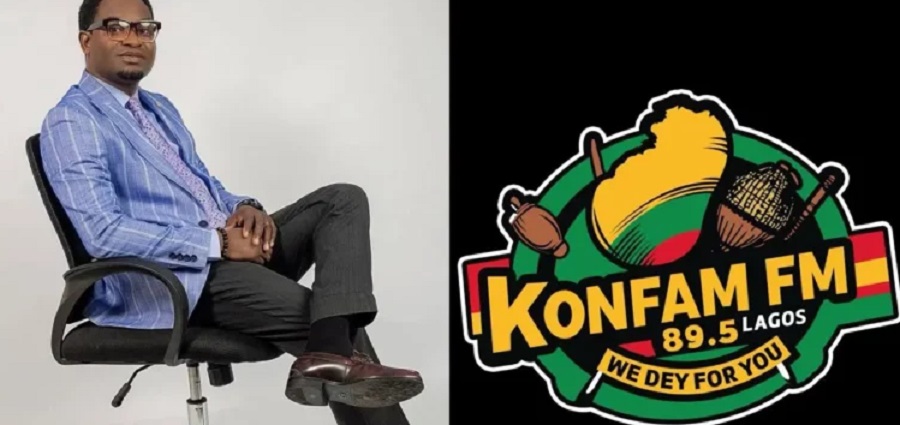Broadcasting
5 Interesting Things You Need to Learn About the Life of Nigerians

With billions of people using sharing apps globally, it’s becoming increasingly easy to understand how digital patterns and routines impact their physical lives.

In Nigeria where millions of the young users have embraced SHAREit Lite as their preferred content sharing platform, similar behavioural patterns are observed across different segments of the demographic.
Marvin Umebiye, Regional Marketing Director, SHAREit Lite, Nigeria says “Nigeria is widely acclaimed as a high-potential nation with a population of over 200 million people, whose uniquenesses are portrayed in their Music, Art, Culture, Food, and digital lifestyle. This makes Nigerians very important in the grand scheme of life itself..”
Below are interesting facts we’ve come to learn about Nigerians – most of which aren’t surprising given the energetic and animated minds of most Nigerians.
- Nigerians love sharing content and telling their own stories
Irrespective of the age, gender, religion or beliefs, storytelling is a big part of life for an average Nigerian. This is reflected in how much they like to take pictures and document videos to later share within their networks. On key occasions such as birthdays, family parties, weddings, house warming parties and even outings, the sharing habit quadruples. The affinity of Nigerians to savor memories through pictures and videos contributes to why smartphone penetration is on the rise, exceeding 30 million people compared to the previous decade. It equally explains why many Nigerians use SHAREit Lite to ensure that their stories and content are shared in a coordinated manner and the quality of shared files is retained, compared to other platforms.
2. Music is a big part of Nigerians’ way of life
On a platform like SHAREit Lite, music is one of the most-shared file categories in recent times. If history is anything to go by, Nigerians are largely drawn to their music. Little wonder its music industry has recorded major success with Nigerian songs and artistes taking the center stage on the global music mainstream. Currently, Nigeria’s multi-billion dollar music industry is valued at $8billion. Beyond intellectual royalties, the digital behaviour of Nigerians towards streaming, downloading, and sharing local songs contributes to the industry’s success.
As afro-beats and African music continue to evolve, Nigerians are getting more attached to indigenous artists and their works. Of late, there has been a surge in music content sharing and this trend continues to rise among the young demographic.
3. Nigerians give high importance to education and learning
Education is important to Nigerians. More often than not, Nigerians rely on digital platforms to enhance their learning processes due to easy content accessibility, group sharing, and peer-to-peer learning. However, when it comes to learning, the content sharing behaviour plays out more vividly during critical times; example of such is when millions of students enroll for regional or national exams.
As of 2021, West African Examination Council – WAEC (a regional exam) recorded more than 1.57 million students undergoing the academic exercise. During times like this, documents such as past questions or exam theses are exchanged among studies across mobile devices. Awide range of academic materials are also shared with each other regularly by Nigerian students looking to ace their studies – the rate of academic file sharing only dwindles during non-academic seasons.
4. Nigerians use a wide variety of mobile and creativity applications
One important digital behavior of Nigerians is their high appetite for mobile app usage. Nigerians use various social media , gaming, finance, and other apps for their day-to-day activities. For instance, every Nigerian has at least one gaming or creativity application on their phones which they relish during their leisure time.
As such, they are prone to recommending similar apps to their friends and loved ones, thereby improving the sharing frequency of such apps across different mobile devices. Nigerians love spending ample time on their phones and sharing apps that keep them engaged regularly.
5. Entertainment in Nigeria is getting more personalised
Nigeria has one of the largest entertainment industries in the world. PWC reports in its Global E & M Industry Outlook that “Nigeria will be the world’s fastest growing E&M market”. Currently, its movie industry, Nollywood, is regarded as the second-largest producer of movies globally, and it is also valued at $6.4 billion.
More recently, Nigeria’s entertainment landscape is becoming fragmented, leading to the creation of sub-players and personal entertainment hubs. Shifting from the norm of mainstream entertainment, regular Nigerians are now creating and sharing content using their mobile phones.
Ultimately, this new shift has resulted in a new crop of content creators, who despite being fragmented, constitute a significant part of Nigeria’s successful entertainment landscape. With transfer apps like SHAREit Lite, emerging content creators have been able to personalise their content, spread their work and expand their reach faster since they do not have to worry about internet lags or mobile data restrictions.
Broadcasting
Maximise Your Easter Getaway in Nigeria with Smart Travel Hacks

Easter is almost here, and with it comes the perfect opportunity to escape the everyday hustle and embark on a memorable adventure. Whether you’re craving some ‘chilling’ time, quality ‘family’ time, or a ‘pepper dem’ getaway, Nigeria offers endless possibilities for exploration. And the best part? Travelling locally has never been easier or more affordable.

Whether you’re a ‘newbie’ traveller or a seasoned pro, we’ve got you covered with essential hacks that will make your trip a breeze. Say goodbye to stress and hello to smooth sailing as you navigate your Easter getaway like a true travel expert.
Planning your trip is like packing your suitcase – essential, not optional
Just like you wouldn’t leave home without your power-bank (just in case!), don’t head off on a quick trip without a plan. A little prep can save you time, money, and stress — from booking flights and sorting transport, to packing light and right.
Nigeria has endless ways to travel. Flying with local airlines like Air Peace or Ibom Air is quick and budget-friendly, while renting a car gives you the freedom to explore scenic routes like the drive to Erin-Ijesha Waterfalls or the journey to Obudu Cattle Ranch. Not into driving? Buses like Peace Mass or God is Good are easy and affordable. And for a truly luxurious experience, you could even consider a chartered flight – if you’re balling!
Travel like a pro: The art of smart packing
Packing smartly is a crucial travel hack that can save both time and money. Amelia Campher recently shared on TikTok how she organised her hair, beauty, makeup, and personal accessories into different vanity cases and toiletry bags from Temu. Each one perfectly stores her daily essentials, keeping everything neat and accessible. She excitedly told her followers, “This is your sign to buy these bags!” Her clever packing strategy ensures that she’s ready for any trip without unnecessary clutter or stress.
Take Jasmin’s experience, for example. After getting hit with extra carry-on fees on a previous flight, she decided to be smarter about her upcoming family trip. In her search for a solution, she found the perfect backpack on Temu for just under ₦40k. Ticking all the boxes, it avoided extra carry-on fees and allowed her to efficiently pack 16 items plus a makeup bag. When they arrived at the airport, Jasmin’s family breezed through check-in with no issues, their backpacks meeting size requirements perfectly. No extra charges, no stress; just a smooth start to their unforgettable five-day family trip.
Backpacks aren’t just ideal for air travel – they’re also perfect for road trips. Whether you’re cramming your car with family and their belongings or flying high, packing smart and light is essential. A compact, well-organised backpack can make your journey easier, no matter the mode of transport.
To avoid unexpected charges when flying within Nigeria this Easter, it’s crucial to familiarise yourself with airline baggage policies; while Economy Class typically permits 15kg to 20kg of checked luggage, and Premium Economy or Business Class allows up to 30kg, always verify specific weight limits with your chosen airline to prevent costly excess baggage fees, especially if you plan on packing more than the standard allowance.
No passport needed: Pack your bags for a Naija Detty Easter
Why travel halfway across the world when Nigeria has it all? This Easter, skip the long-haul and discover the treasures on your doorstep. From the buzzing streets of Lagos to the ancient city of Benin and the serene hills of Jos, unforgettable adventures are just a short trip away.
By travelling locally, you’re not only creating new memories — you’re also supporting local tourism and helping grow our economy. With so many destinations to explore, there’s something for every kind of traveller. So pack your bags, plan smartly, and make this Easter your best Naija Detty holiday yet.
Broadcasting
KONFAM 89.5 FM Hits Airwaves in Lagos Tomorrow

The heartbeat of Lagos is about to receive a powerful new rhythm as KONFAM 89.5 FM officially launches in Lagos tomorrow, Wednesday.

Kayode Adegbite, founder, KONFAM FM,
KONFAM FM, Kayode Adegbite, brainchild of seasoned entrepreneur and media innovator, is a cutting-edge radio station poised to redefine the broadcasting landscape in Nigeria.
It promises to bring a fresh, tech-driven, and culturally rich approach to radio transmission.
Described as a fusion of technology, creativity, and community, KONFAM FM aims to captivate Lagosians with content that speaks directly to their experiences.
Whether it’s music, news, entertainment, lifestyle, or talk shows, the station is built to reflect the soul of the city and the pulse of its people.
Adegbite is no stranger to transformation.
As CEO of MediaCrush Nigeria Ltd, a leading Out-of-Home (OOH) advertising company, he has spent the past decade revolutionizing how brands engage with audiences across Nigeria.
With over 20 years of experience spanning finance, marketing, and media, he is now channeling his vision into broadcasting.
“KONFAM is not just another radio station,” Kayode said in a pre-launch interview.
“It is a movement, a platform for authentic voices, compelling stories, and meaningful conversations that empower and entertain.”
From its sleek state-of-the-art studio in the heart of Lagos to its impressive lineup of on-air personalities and programs, KONFAM FM is designed to be interactive, engaging, and youth-focused.
Broadcasting
Subscriber Withdraws Suit against MultiChoice, FCCPC over Price Hike

Festus Sanmi Onifade, subscriber and legal practitioner, has withdrawn his lawsuit challenging alleged unfair price hikes by MultiChoice Nigeria Limited, filed at the Federal High Court in Abuja.

Also listed as a defendant in the suit is the Federal Competition and Consumer Protection Commission (FCCPC).
In a notice of discontinuance, dated April 1, 2025, the claimant formally informed the court of his decision to wholly withdraw the suit, marked FHC/ABJ/CS/363/2025.
However, the notice, signed by Onifade, did not advance reasons for the withdrawal.
Onifade had earlier approached the court to challenge what he described as an unfair and unjust price increase announced by MultiChoice Nigeria, slated to take effect from March 15, 2025.
In the originating summons, he asked the court to determine, among other things, whether, given Section 128 of the Federal Competition and Consumer Protection Act, 2018, and other relevant laws, the notice of the impending price increase issued by the first defendant was not unfair, unjust, grossly inadequate and a breach of his consumer rights; whether, considering the subsisting appeal in MultiChoice Nigeria Ltd & Ors v. Festus Onifade & Ors, the defendant was not stopped from further increasing the price of its services.
The suit centred on legal tussle between Onifade and MultiChoice over price hikes, which the claimant insisted were being implemented in defiance of regulatory standards and without adequate consumer engagement.

 General News2 days ago
General News2 days agoSanwo-Olu, Others Grace Launch of 50-Bed Hospital in Surulere by Avon Medical

 E-Financial2 days ago
E-Financial2 days agoCBN Pumps in Additional $150m into Forex Market to Safeguard Naira

 E-Financial2 days ago
E-Financial2 days agoSEC Says CBEX, other Unregistered Digital Platforms are Illegal

 Broadcasting2 days ago
Broadcasting2 days agoKONFAM 89.5 FM Hits Airwaves in Lagos Tomorrow

 Telecom2 days ago
Telecom2 days agoMTN, Meta Partner to Enhance Voice and Video Calling Quality

 General News1 day ago
General News1 day agoWorld Bank Announces $800m Support for Nigeria’s CCT Initiative

 E-Financial2 days ago
E-Financial2 days agoKenyan CBN Okays Access Bank Full Acquisition Of NBK

 E-Business2 days ago
E-Business2 days agoSERAP Calls for Withdrawal of Nigeria’s Data Act Amendment




























